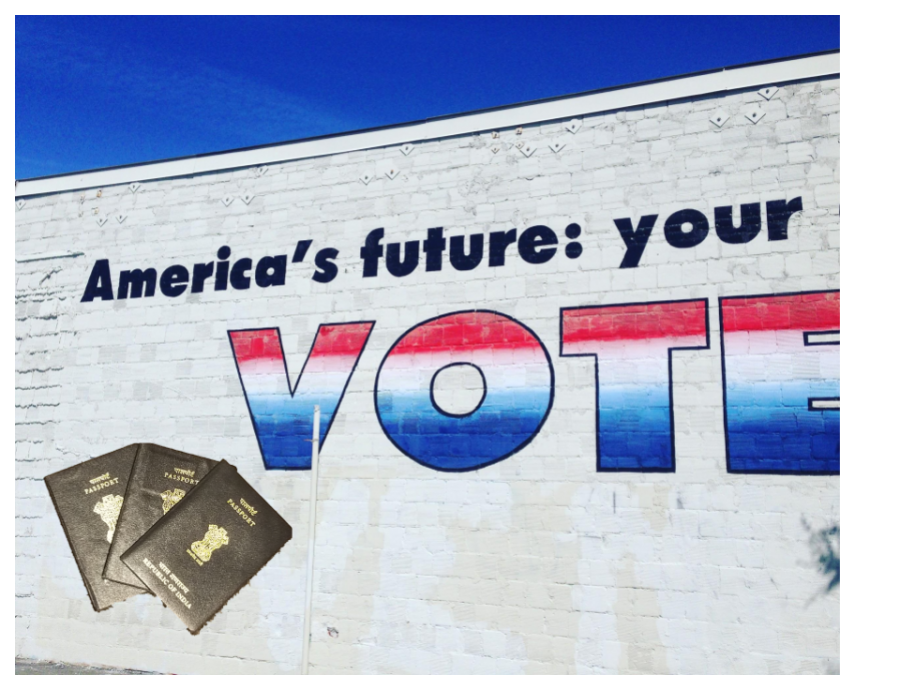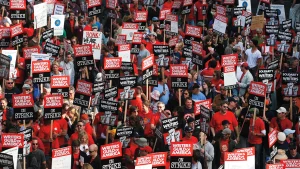Looking at the election through the eyes of a non-citizen
Expressing their voice without voting. Non-citizens with a foreign passport scratch their heads when election time comes near. They put their full trust into citizens to exercise their power to vote and choose leaders that will benefit the country. “I try not to stress and hope that the people of America know the power their leader has and choose one that will not abuse that power,” says Surabhi Mishra. Photo used via Wikimedia Commons under Creative Commons. Edited by Naisha Roy.
November 9, 2018
Streets are filled with red, white and blue as the elections draw near. Protests for and against candidates fill the roads. All the news stations can talk about is the competitors. People set up ballots and polling stations and place signs along sidewalks. Families make plans to attend the nearest voting location and how to avoid the long, curving lines. But, for a non-citizen, this isn’t the case.
Non-citizens have many of the same rights as citizens in the United States. The rights of free speech, religion, protection under the law, and life and security are all covered in sections of the Bill of Rights, for “aliens” and citizens alike. But for those that don’t have a U.S. Passport, one of the biggest hurdles they face is not being able to vote for their (federal) leaders.
For many immigrants and non-citizens, voting is like looking at a pendulum that decides their future and being able to do nothing to stop it. In fact, many of these “aliens” take matters into their own hands and illegally register to vote. An academic report published in the December 2014 issue of Electoral Studies found more than 14 percent of non-citizens in 2008 and 2010 samples reported being registered to vote. The results illustrated in the study explain the lengths foreigners will go to have their voice heard, even if it means potentially winding up in jail. The following video by ABC 15 Arizona News shows a non-citizen illegally registering to vote:
Surabhi Mishra, the mother of a student here at South Forsyth, explains that elections can be a roller-coaster in the lives of her and her family.
“Part of our family is here on a working visa,” Mishra reveals. “My heart drops around election time as there are always people who want to make us go back to our country, forgetting that America is a land of immigrants.”
Her family, like many others at South Forsyth, are in the process of becoming citizens through visas and GreenCards. The elections are a crucial time for them because the people that win will eventually make the laws, including the ones regarding immigration. Surabhi doesn’t think that non-citizens necessarily need the right to vote.
“I don’t think it [non-citizen voting] should be legal since this a very sensitive topic,” Mishra states, “I rather believe that the process of becoming a citizen should be easier or shorter.”
Even though voting for foreigners is illegal, there are many other ways non-citizens can influence the elections and make their voice heard. For example, attending rallies and raising awareness for the candidate they support can make a difference in what people decide to vote for. According to the National Conference of State Legislatures, non-citizens can still vote in some local and state elections, just not federal ones. They should exercise this right so that they have an input in their local area at least. Social media is also a huge factor in voting, so these “aliens” can use it as a tool as well.
“I openly advocate for candidates and discuss politics with many of my friends who are citizens,” Mishra says. “I hope my voice is heard by them so they can convey our message to the American government.”
Even though they can’t directly speak to the government, non-citizens can voice their opinion to their friends and spark a movement or at least influence the decision.





